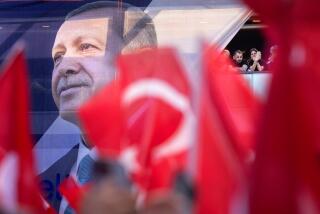Iraq War Remains Unpopular in Strategically Located Turkey
- Share via
ISTANBUL, Turkey — As the Bush administration intensifies efforts to line up international support for possible military action, a war against Iraq remains deeply unpopular in this predominantly Muslim nation.
“Why should our sons die so that America can occupy Iraqi oil fields?” asked Ayse Matarci, an Istanbul homemaker, as she shopped for vegetables at a local market. “Turkey should not dip its hands into Iraqi blood.”
Strategically wedged between Europe and the Middle East and with a roughly 200-mile border with Iraq, NATO’s sole Muslim-majority member is set to play a pivotal role in any war against its southern neighbor.
Eager to bolster ties with the West, Turkey’s government formed by the Justice and Development Party, which swept into power in Nov. 3 elections, has said it is prepared to help the war effort under some conditions, such as U.N. approval of military action. Turkish leaders have said they would allow the use of bases and are considering allowing U.S. troops to move into northern Iraq via Turkish soil.
The main question facing the antiwar movement is whether the public’s dislike of a war can be used to influence leaders’ decisions. “The answer, sadly,” said Aydin Engin, a writer and antiwar activist, “is a big fat no.”
Engin helped organize the biggest antiwar rally here Dec. 1, attracting 10,000 to 15,000 demonstrators. “The turnout was pretty disappointing when you consider that twice as many people were protesting in Australia that day, and that Australia’s population is 19 million, while Turkey’s is 70 million,” Engin said. “The reason is simple. Most people are scared.”
Such fears date back to 1980, when the Turkish military seized power in its third and last coup. The country’s then military rulers drew up a constitution, including restrictions on unions, political parties, free speech and free association.
Successive governments have been amending the constitution as part of an ongoing democratization drive aimed at securing membership for Turkey in the European Union. Even so, public demonstrations are often banned. And when they do take place, police typically use violence to break them up.
“The aim of the authorities is to depoliticize, to intimidate the Turkish people, and they have largely succeeded,” said Gulden Sonmez, a lawyer who works for an Islamic-leaning rights group. “As in many Muslim countries, people here feel they have little control over their destiny. Democracy has yet to fully take root.”
What sets Turkey apart from other predominantly Muslim nations, however, is that antiwar sentiment is rooted neither in feelings of religious solidarity with the Iraqis, nor in pro-Arab sentiment. If anything, there is strong mutual dislike between the Turks and Arabs dating back to when the Ottoman Turks ruled over much of the Arab Middle East and North Africa. In recent years, Turkey has become Israel’s chief regional ally. “Turks are against the war,” explains Tuncay Akgun, a prominent political cartoonist, “because of what Turkey itself stands to lose in such a war.”
The chief concern shared by ordinary Turks and policymakers is that the Kurds who have controlled the north of Iraq since the end of the 1991 Persian Gulf War will exploit the turmoil that is likely to follow Saddam Hussein’s removal to set up their own independent state. That in turn could reignite separatist sentiment among Turkey’s own restive Kurds, some officials fear.
The other worry is economic. Turkey says it has lost more than $40 billion in trade with Iraq as a result of United Nations sanctions against Baghdad following its 1990 invasion of Kuwait. Another war would kill trade that has climbed back to prewar levels under a U.N. program.
It would also hurt Turkey’s multibillion-dollar tourist industry. The Bush administration has reportedly proposed an aid package to compensate Turkey for its losses. “So far, they’re asking for the moon and offering peanuts in exchange,” said a senior Turkish official, who declined to be identified by name.
More to Read
Sign up for Essential California
The most important California stories and recommendations in your inbox every morning.
You may occasionally receive promotional content from the Los Angeles Times.













